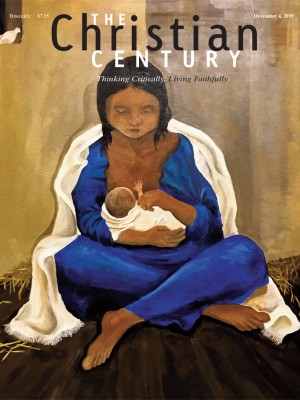Who’s the parasite?
Bong Jong-ho’s genre-bending film reveals the fantasies of salvation that feed off of us all.

Bong Joon-ho’s magnificent genre-bending movie Parasite is a funny, deeply satirical look at class divisions, told through the intersecting lives of three families in Seoul, South Korea. It morphs into a psychological thriller that plays with various meanings of the title and exposes the secrets and lies of a society marked by radical economic inequality.
The Kim family—father, mother, and young adult son and daughter—share a tiny, squalid semi-basement apartment in one of Seoul’s many overcrowded back allies that make up a labyrinthine network of poverty and desperation. We meet the family pirating the last remaining free wireless signal—accessible only in the toilet—and clumsily assembling cardboard boxes for a local pizza chain for pennies a box. They embody the precarity of life in the globalized gig economy. But they refuse to see their steady decline into deeper poverty as inevitable, always hoping the next gig will reverse their fortunes.
Read our latest issue or browse back issues.
Their hopes seem to come true when the son, Ki-woo (Choi Woo-shik), lands a job as an English tutor for the wealthy Park family. The Parks live, literally and figuratively, above the slums in a house that resembles a bubble of glass, air, and light. Ki-woo’s amazement at their refinement and luxury quickly moves into savvy schemes about how to enrich his family. Like a team orchestrating an elaborate heist, the Kims quickly infiltrate the Park family, making themselves indispensable in a range of service jobs.
The sequence by which they execute this takeover is very funny and very smart. It shows that the true product of globalization is a lifestyle ideal—the notion that the good life can be created through consumption and image production. The Kims know that what the Parks really want is to feel that their lives are extraordinary, the product of care and taste. They don’t want just a driver; they want an experienced, elite driver. They don’t just want someone to babysit their wild eight-year-old son; they want someone who will tend to his inherent artistic genius. So, for example, when the daughter, Kim Ki-jeong (Park So-dam), passes herself off as an art teacher trained in the States, she quickly leverages her position into that of a full-blown art therapist, using an authoritative personality and some buzzwords gleaned from an internet search.
The internet is essential to the Kims’ success. Through Google and YouTube, the Kims understand everything they need to know about the Parks. The reverse is not true: the Parks cannot imagine the lives of the Kims. Even their sensory data—especially the way the world smells to them, which becomes a fatefully important fact—is different for them. Because of this, they cannot imagine that what they take to be their unique, carefully cultivated life is being manufactured by a family of poor hucksters.
In an obvious way, the Kims are the parasites named in the title; they latch onto the Parks and suck out as much income as possible. But the metaphor also applies to the Parks, for their entire life is built on a myth of exclusivity being sold to them by the very poor. They assume that their tastes and preferences are so rarefied that anyone who caters to them must be doing so authentically.
The humor and satire works brilliantly because we see how all of this can be faked with the help of Photoshop and a couple of YouTube tutorials. The Parks are the parasites whose entire lives—from their beautifully made objects to their carefully arranged schedules to their very ideas about themselves—depend on the physical, emotional, and intellectual labor of people they know nothing about.
This insight alone makes the film an effective social satire. But about halfway through the movie, the Parks’ former housekeeper returns, we meet a third family, and the tone of the movie shifts into that of a thriller. This genre twist allows Bong to play with conventions from horror movies—ghost stories and haunted houses—even as he continues to explore the theme of parasitism.
The true parasite, we start to realize, is the belief that all the characters share: that a perfect life can be made through wealth and consumption. It really does not matter who lives in the house or who lives below it; all of these bodies are just hosts for an insatiable phantasm driving a cycle of radical inequality.
Near the end of the film, Ki-woo makes a rousing speech about pulling himself up by his bootstraps, replacing the Parks, and saving his family. If we were cheering for the Kims as they knowingly manipulate the Parks, we now realize something far bleaker: the Kims are prey to the same fantasy of salvation through wealth and consumption. The fact that Ki-woo’s fantasy sounds so much like stories we tell about the American—now globalized—dream suggests that we may be playing host to the same parasite.
A version of this article appears in the print edition under the title “Who’s the parasite?”






